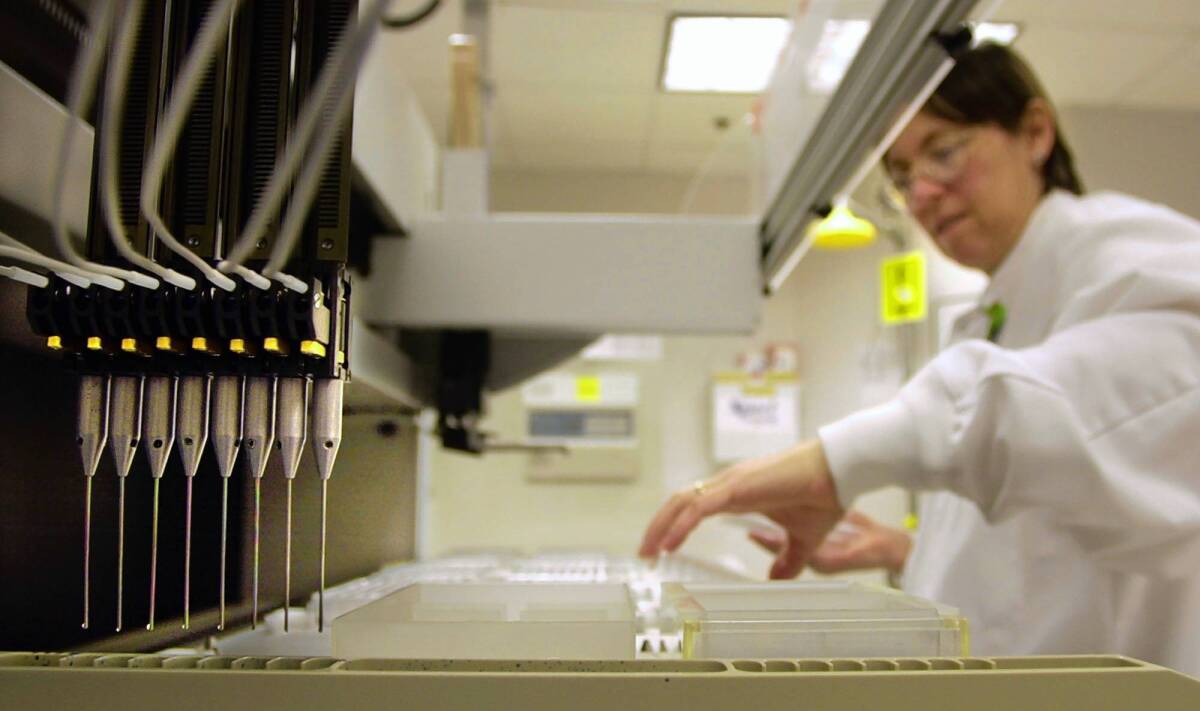Human gene patenting is a thing most of us aren’t ready for

- Share via
In the course of our country’s history, the U.S. Patent and Trademark Office has bestowed coveted protection on many strange and wondrous inventions: the three-legged pantyhose (in case one leg runs), the sealed, circular peanut butter-and-jelly sandwich, the motorized ice cream cone.
And of course, the human gene.
The human gene?
How is that even possible? Could you patent a cat’s whiskers? A cloud formation? A comb-over for a balding man? (Ah, well, yes, there is a comb-over patent out there somewhere.)
The idea that the essence of our biology could be patented in the manner of an alarm clock or windshield wiper, however, came as a shock to the many of us who don’t follow the legal struggles of the biotech world. Yet gene patents have existed for 30 years.
Until, that is, the U.S. Supreme Court unanimously declared last week that the natural human gene cannot be commercially owned.
Many of us were unaware that this was even a thing until last month, when Angelina Jolie announced that she had opted for a double mastectomy after discovering she carries a genetic mutation that gave her an 87% chance of developing breast cancer and a 50% chance of ovarian cancer at some point in her life. She had discovered her risk after taking an expensive test developed by Myriad Genetics, the Utah firm whose gene patents were the subject of the Supreme Court decision.
“The cost of testing for BRCA1 and BRCA2, at more than $3,000 in the United States, remains an obstacle for many women,” Jolie wrote in the New York Times.
Her mild critique unleashed a whiff of unseemliness about the cost of the BRACAnalysis test, as many women — especially the uninsured — came forward to say they were at risk but could not afford to take it.
Why is the test so expensive? There’s no competition; Myriad has a zealously enforced monopoly.
After Jolie’s bombshell essay ran, Myriad went into something of a defensive crouch, insisting the great majority of its tests are covered by health insurance. The company said it has provided financial assistance to 5,000 women who could not afford the fee.
The very idea that a biotech company could hold a monopoly on a piece of the human genome (let alone a test) was offensive to most of us lay folks, even if the purpose was a noble one: a diagnostic test that would reveal whether a person carried a gene mutation that made her more likely to get breast or ovarian cancer.
Myriad had claimed that by isolating the genes from the rest of the human genome, it had created something outside the realm of the natural world. “No one can patent anyone’s genes,” the company says on its website. “In order to unravel the mysteries of what genes do, researchers have had to separate them from the rest of the DNA by producing man-made copies.... These man-made copies, called “isolated DNA,” are unique chemical compositions not found in nature or the human body.”
Not so, said the court, concurring with the geneticists — including a principal researcher on the Human Genome Project — who filed friend-of-the-court briefs.
“A naturally occurring DNA segment is a product of nature and not patent eligible merely because it has been isolated,” wrote Justice Clarence Thomas, who wrote the court’s opinion.
Nothing “man-made” about it.
The financial stakes are what make the concept worth fighting over. According to Forbes magazine, Myriad spent $500 million over the course of 17 years before it turned a profit on its patented BRACAnalysis test. But the payoff has come. Last year, the company’s profit margin was 22.6% on revenues of nearly $500 million. More than 80% of Myriad’s revenue comes from the proprietary test.
Myriad, though, despite its groundbreaking and livesaving work, has come off as some sort of villain in the drama.
“A company that is widely regarded as being an efficient laboratory, was a startup that helped discover the genetic cause of two dread cancers and provides a service that allows people at risk to mitigate the risk is nonetheless reviled,” wrote geneticists Robert Cook-Deegan and A.L. Baldwin of Duke University last January in the journal Genome Medicine. “This should be a hero story, but is instead a dark narrative.”
Citing a review of English-language articles about Myriad and its BRCA gene patents, the authors said that Myriad has not only received more attention than other companies involved in gene patent controversies, but that nearly 78% of the coverage was negative.
Why has Myriad ended up with a black eye? The authors say it wasn’t the gene patents — lots of companies have them. But in its relentless protection of the patents, the writers said, Myriad acquired a reputation not just for “legalistic bullying” but for obstructing research. Cook-Deegan and Baldwin cited one case study of Myriad that found that to many researchers, “it seemed Myriad was willing to block scientific research to turn a profit.”
Among the plaintiffs in the case against Myriad were geneticists who claimed they were forced to stop administering tests to patients, even though they charged less than half of what Myriad charged, and patients who were dismayed they were unable to get second opinions.
Myriad defends itself from those charges on its website and notes that 18,000 scientists have studied the patented genes, and 10,000 scientific papers have been published about them.
Still, it was hard to find anyone who was disappointed by the Supreme Court’s ruling. Even Myriad put on a happy face, tweeting: “Now that the Supreme Court battle is over, it’s back to the REAL battle — the one against disease!”
Personally, I’m thinking about patenting a four-legged pantyhose.
More to Read
Sign up for Essential California
The most important California stories and recommendations in your inbox every morning.
You may occasionally receive promotional content from the Los Angeles Times.











